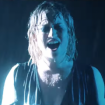Emma Boster never saw herself fronting one of the most exciting acts in metalcore. Instead, she dreamed of winning American Idol.
As a kid, she'd line up her stuffed animals in front of her karaoke player, close her eyes and feel herself in front of the garish stage lights. She'd sing Avril Lavigne to her plushy audience before deciding on her audition song: the Beatles' "Let It Be."
Boster never did get to that audition. It's a blessed turn of fate for the metal community. Today, the singer fronts Dying Wish — the Portland, Oregon, rising stars that have become our present-day answer to the deluge of great metalcore bands we were treated to in the Aughts.
Boster and her band are reinvigorating the genre with a politically conscious animus, while touring with heavyweights including Limp Bizkit, Hatebreed and Motionless in White. Their stellar 2021 debut album, Fragments of a Bitter Memory, which featured a guest spot from Bryan Garris of scene leaders Knocked Loose, earned them nominations for "Best International Band" at the U.K.'s Heavy Music Awards, while this magazine has described them, on numerous occasions, as one of the best bands out there right now.
This year, they release their follow-up: the skin-melting, brain-expanding Symptoms of Survival. Dying Wish have already risen far higher than any of its members ever anticipated, but they're playing it cool, taking a leaf out of the Beatles' book. They're letting it be.
Boster threw her American Idol dreams aside and began blazing her own trail in 2011, at the age of 15, when she attended her first DIY punk show at an anarchist bookstore in Portland. Besides Warped Tour headliners Paramore, Boster had never seen women playing anything on the heavier side of the sonic spectrum — but at that bookstore she was thrown into the deep end of diverse, delightfully belligerent music.
She saw women screaming their lungs out, whipping up a frenzy among the mostly queer crowd, sweating, bleeding, becoming as feral as one could possibly be. The energy created in that dingy un-air-conditioned space — the size of Boster's living room, packed with 100 sweat-dripping individuals — was deeply transformative, almost spiritual.
Her eyes were opened to a whole new world. Hardcore began to take over her life. "It was a vibe that I never felt before," says Boster. "I felt that I had found my purpose and my true self in that room."
Alongside a friend she'd met on Myspace named Brian, who introduced her to the likes of Have Heart, Comeback Kid and Down to Nothing, she began regularly taking the half-hour-long journey from her suburban Oregon City home to that Portland bookstore. Boster quickly mixed in with the local scene, absorbing all she could from her hardcore elders.
She'd return to the suburbs and share everything she'd learned with former middle school friends and current bandmates Jeff Yambra (drums) and Pedro Carrillo (guitars). Back in the bookstore, there was an understanding among the tight-knit crowd: Everyone there was a reject from modern society; hardcore was a way to create their own alternative community, an antithesis to the world outside.

It was the first time Boster felt like she fit in anywhere. She'd spent much of her youth moving around, transferring schools. In small-town Oregon, between the rednecks and suburbanites, she hardly found anyone to call a friend. She developed a steely demeanor, cultivating a defense mechanism between her and everyone else.
She began teasing her hair, intensifying her eyeliner — a visual expression that she wasn't like everyone else. She was bullied, mostly by young men. She began to bully back. It's a kind of vengeance that's carried over into her own music, her screams a form of vigilantism sonically punishing everyone who's ever wronged her.
Boster was 21 when she first formed her own band, desperate to scream her heart out. While they played small bars across Portland, she also began booking shows for other bands and soon found her own voice within the scene. She believed desperately in her local scene and its power to confront and upend much of the conservatism and racism that had plagued the majority white Beaver state.
When she formed Dying Wish several years later, she expected only to remain in her hometown and state. And then, out of nowhere, the group exploded. "We were just this shitty little punk band, now look where we are," says Boster with amazement.
Dying Wish's 2021 debut Fragments of a Bitter Memory combined the political and the personal. Screeds against neo-colonialism and police brutality — which were directly inspired by the band's involvement in the 2020 George Floyd protests in Portland — were sandwiched between anthems about Boster's experiences as a survivor of childhood trauma.
With its 2000s metalcore, Killswitch Engage-inspired sound and forward-thinking flourishes, it quickly evidenced Dying Wish as one of metalcore's most promising prospects.
Boster wrote much of that album during the earliest days of the pandemic, when lockdown forced her into deep self-reflection and introspection. It was a state that inspired the album's standout cut, the title track.
Over a melodeath soundscape, Boster walks us back to her first memory, when she was a flower girl at her mother's wedding, watching as she was about to marry the man who would spend "the next decade verbally and physically abusing her." "I would bury you if I could," Boster screams at the track's climax.
"Screaming that over and over again has really helped with the healing process," says Boster. "Having people relate to it and talking about these things openly … was really liberating for me. It helped me toward the acceptance stage of my trauma."
While Boster describes Dying Wish's debut as a "trauma dump," the band's second album finds them enjoying a new sense of confidence and maturity. Symptoms of Survival looks outward to the world, towards the nature of war and destruction itself.
"Symptoms of survival, I will take your life or you'll take mine," Boster chants on the title track, a song about the victims of America's mass war machine. "Another symptom of survival [is] the planet warming at an excessive rate — and all the anxiety and depression and regret that comes with that. It's an issue beyond ourselves. The world is just fucked up."
The album also features the band's most personal tracks yet, several of which have thematic through lines that connect to Fragments of a Bitter Memory. Boster reports that "Fragments" directly inspired the new "Path to Your Grave" (which borrows its title from a lyric in that 2021 track) as well as the ballad "Paved in Sorrow."
"I had these new feelings spark up about my younger sister," says Boster about the first time she heard the instrumental for "Paved in Sorrow." "She experienced a lot of neglect; I wrote 'Fragments' about her dad. And so 'Paved in Sorrow' was just kind of me saying, I'm sorry…"
Through their music, Dying Wish are relaying life's complexities — both through their own lived experiences and by drawing attention to the patterns of destruction inherent in humankind. Calling them "female-fronted" belittles and misunderstands their enormous group mission, a brandishing Boster's noticed the bigger her band has become.
"There are a lot of really talented women playing music, but I want to see us all being mixed in together, and taken seriously within the metal music scene, and not just put into our own subcategory."
Dying Wish's music is something that unearths the most buried parts of ourselves, making us sit with it, face up to it, learn from it. It's as large as life, as sure as death. It's a miracle that Boster found hardcore, that she never did attend an American Idol audition.












